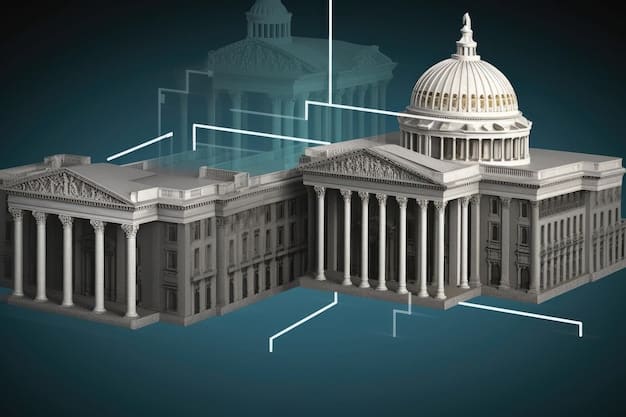Understanding the US Legal System: Key Rights & Responsibilities in 2025

Understanding the US Legal System: Key Rights and Responsibilities in 2025 involves navigating laws, amendments, and judicial precedents while being aware of personal rights, responsibilities, and potential legal ramifications, influencing how individuals interact with the government, courts, and other citizens.
Navigating the complexities of the US legal system can be daunting. Understanding the US Legal System: Key Rights and Responsibilities in 2025 is crucial for anyone living in or planning to live in the United States. This guide will break down essential aspects, ensuring you are well-informed and prepared.
Understanding Your Fundamental Rights in the US
Every individual within the United States, regardless of citizenship status, is afforded certain fundamental rights. These rights protect individuals from governmental overreach and ensure fair treatment under the law. Knowing these rights is the first step in navigating the US legal landscape.
These rights are enshrined in the Bill of Rights, the first ten amendments to the US Constitution, and subsequently expanded through legislation and judicial interpretation. They form the bedrock of personal freedom and legal protection.
The Bill of Rights: A Foundation of Freedom
The Bill of Rights guarantees essential freedoms and protections. Let’s look at some key amendments.
- First Amendment: Guarantees freedom of speech, religion, the press, the right to assemble, and the right to petition the government. This means you can express your opinions without fear of government censorship, practice your religion freely, and participate in peaceful protests.
- Fourth Amendment: Protects against unreasonable search and seizure. Law enforcement generally needs a warrant based on probable cause to search your property or person.
- Fifth Amendment: Protects against self-incrimination (the right to remain silent), double jeopardy (being tried twice for the same crime), and guarantees due process of law.
- Sixth Amendment: Guarantees the right to a speedy and public trial, the right to an attorney, and the right to confront witnesses.
These are just a few examples; each amendment contains vital protections for individuals interacting with the legal system. Understanding these rights is paramount to ensuring they’re not infringed upon.
In conclusion, knowledge of fundamental rights protects individual freedom and helps to ensure fair and just treatment under the law, forming the basis of the U.S. legal system.
Navigating the US Court System
The US court system is a dual system, comprising both federal and state courts. Understanding the structure and jurisdiction of these courts is important for knowing where a legal matter may be heard.
The federal court system handles cases involving federal laws, disputes between states, and cases involving the US government. State courts handle the vast majority of legal cases, including those involving state laws, contracts, and family matters.

Federal Court Structure
The federal court system is structured in a three-tiered hierarchy.
- District Courts: These are the trial courts of the federal system. Cases originate here, and evidence is presented.
- Courts of Appeals: These courts review decisions made by the district courts. They do not retry cases but rather examine legal errors.
- Supreme Court: The highest court in the land, the Supreme Court, has the final say on matters of federal law and the US Constitution.
State Court Systems
Each state has its own court system, typically mirroring the federal structure, including trial courts, appellate courts, and a state supreme court. The specific names and organization may vary, but the fundamental functions remain similar.
Navigating the court system, whether federal or state, often requires the assistance of legal counsel. Attorneys can provide guidance, represent you in court, and ensure that your rights are protected throughout the legal process.
In summary, the US court system is divided into federal and state levels, each with its own distinct structure, impacting how legal disputes make their way through the system.
Responsibilities as a US Resident
Living in the United States comes with certain legal responsibilities. These responsibilities are not only legal obligations but also contribute to the overall functioning and well-being of society.
Responsibilities range from obeying laws and paying taxes to serving on a jury and registering for selective service (for eligible males). Upholding these responsibilities is crucial for maintaining a just and orderly society.
Obeying Laws and Paying Taxes
Adhering to laws and fulfilling tax obligations are fundamental civil duties.
- Obeying Laws: This includes federal, state, and local laws. Ignorance of the law is not an excuse, so it’s essential to be aware of the legal rules governing your conduct.
- Paying Taxes: Taxes fund essential government services, infrastructure, and social programs. Properly filing and paying taxes is a critical civic responsibility.
Serving on a Jury
Jury duty is a crucial component of the justice system. Individuals selected for jury duty have a legal obligation to serve, unless they meet specific exemption criteria. Jury service safeguards the right to a trial by jury, a cornerstone of American justice.
Additionally, it’s essential to respect the rights of others, participate in civic life, and stay informed about important issues. Active and responsible citizenship contributes to a stronger, fairer, and more democratic society.
In conclusion, being a resident of the United States comes with the responsibilities of obeying the law and paying taxes to support the functioning the country.
Common Legal Issues and How to Address Them
Many people encounter legal issues at some point in their lives. Knowing how to address common legal problems can alleviate stress and ensure a fair resolution.
Legal issues can range from contract disputes and traffic violations to family law matters and employment issues. Each type of issue requires a different approach and may necessitate the assistance of legal counsel.
Contract Disputes
Contract disputes arise when one party believes the other has violated the terms of an agreement. This spans from simple breach-of-contract issues to more complicated breaches of contract.
- Gather Documentation: Collect records such as contracts, emails, and any other relevant communication.
- Consult with an Attorney: A lawyer can review the contract and decide if you have a valid case.
Traffic Violations
Traffic infractions come with their set courses of action and consequences.
- Understand Your Options: Based on the infraction, you can pay the fine, contest the ticket, or attend traffic school.
- Consider Legal Counsel: For extreme charges like as DUI, seek the help of an attorney.

Early intervention and informed decisions are critical when dealing with legal issues. Consulting with a knowledgeable attorney and understanding your options can significantly impact the outcome of your case.
In summation, legal troubles vary from contract disagreements to visitors’ infractions, which can be addressed by gathering proof and seeking legal recommendation.
Changes to US Laws and Regulations to Expect in 2025
The legal landscape is constantly evolving. Keeping abreast of anticipated changes to laws and regulations is essential for individuals and businesses alike to prepare for the future.
Areas such as data privacy, employment law, environmental regulations, and immigration policies are frequently subject to change. Staying informed ensures compliance and minimizes potential legal risks.
Anticipated Focus Areas
Some key areas where changes can happen.
- Data Privacy: With growing focus on data safety, count on tougher guidelines and more extensive patron rights regarding personal data.
- Employment Law: Rules concerning far-flung work, gig financial system, and worker classification are possibly to evolve to address new challenges and concerns.
Resources for Staying Informed
Staying informed on legal adjustments requires using various resources and staying engaged with authoritative sources. It is also recommended to find legal aid regarding the specific type of law in question.
Staying proactive and informed about legal changes enables individuals and businesses to adapt and comply with new regulations. Continuous learning and engagement are key to navigating the evolving legal world.
In conclusion, legal guidelines trade continuously, which is why people and businesses must remain informed approximately changes in data privacy and employment legal guidelines.
Finding Legal Assistance and Resources
Navigating the legal system often requires professional assistance. Knowing where to find reliable legal resources can make a significant difference in protecting your rights and achieving a favorable outcome.
Legal aid organizations, pro bono services, and lawyer referral services can offer valuable assistance to those who cannot afford legal representation. Accessing these resources ensures that everyone has a fair chance to navigate the legal system.
Legal Aid and Pro Bono Services
For those with limited financial resources, legal aid societies and pro bono services can provide crucial support.
- Legal Aid Societies: Provide free or low-cost legal assistance to eligible individuals.
- Pro Bono Services: Many attorneys offer their services for free to those in need.
Lawyer Referral Services
Lawyer referral services can help connect individuals with qualified attorneys who specialize in their specific legal issue.
Accessing legal assistance and resources is vital for ensuring equal access to justice. Whether through legal aid societies, pro bono services, or lawyer referral programs, seeking professional guidance empowers individuals to navigate the legal system with confidence.
In brief, it is essential to find legal assistance from reliable resources, along with felony assist groups, pro bono services, and lawyer referral services, to navigate the legal system effectively.
Conclusion
Understanding the US Legal System: Key Rights and Responsibilities in 2025 equips individuals with the knowledge to protect their rights, fulfill their obligations, and navigate potential legal challenges. By staying informed and proactive, residents can confidently engage with the legal system and contribute to a just and orderly society.
| Key Topic | Brief Description |
|---|---|
| 📜 Fundamental Rights | Bill of Rights ensures freedoms like speech, religion, and protection against unreasonable searches. |
| ⚖️ Court System | Consists of federal and state courts handling different types of legal cases. |
| 🤝 Resident Duties | Include obeying laws, paying taxes, and serving on a jury when called. |
| 💡 Legal Assistance | Available via legal aid, pro bono services, and lawyer referral services. |
FAQ
▼
As a US resident, you have fundamental rights enshrined in the Bill of Rights, including freedom of speech, religion, protection against unreasonable searches, and the right to due process under the law.
▼
The US court system consists of federal and state courts. Federal courts handle federal law, while state courts deal with state law. Both systems typically have trial courts, appellate courts, and a supreme court.
▼
Your responsibilities include obeying laws, paying taxes, serving on a jury if called, and respecting the rights of others. These duties help maintain a just and functional society.
▼
You can find legal help via legal aid societies, which offer free or low-cost services, and by consulting with volunteer attorneys. Lawyer Referral Services may help with reduced fees.
▼
Anticipate possible revisions of data privacy, employment rules, and environmental regulations. Stay updated through professional resources and legal websites to ensure compliance with changes.
Conclusion
Understanding the US legal system equips individuals with essential knowledge for navigating their rights and responsibilities. Stay informed, seek assistance when needed, and contribute to a just society.






